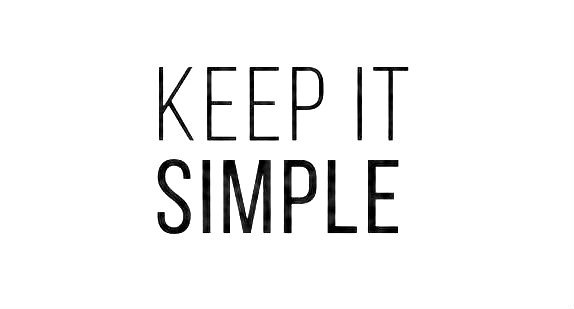KEEPING IT SIMPLE

Nutrition information is everywhere we look today! T.V. commercials, billboards, magazines, new diets promising a 10 lb weight loss in one week, etc.! So why is obesity, type 2 diabetes, cancer, and heart disease still on the rise with all of the information that is out there? One reason is that nutrition information is constantly changing based on the newest research. As health care professionals, we need to stay on top of the latest research and news, and educate our clients on what is true or just a fad. Just because you see a flashy advertisement for a new diet promising extreme weight loss doesn’t mean it is true. Please don’t believe everything you hear and jump on the newest diet craze! What we need to do…. it KEEP IT SIMPLE AND GO BACK TO THE BASICS: NUTRITION 101.
1. Consume balanced, healthy meals and snacks. Each meal should contain vegetables, lean protein, and whole grains. Our bodies need a balance of protein, carbohydrates and healthy fats to function and thrive. I often have clients telling me they are starving by dinner time. When I asked them what was the last thing they ate, they say they had an apple around 3pm. Yes, the apple is healthy but where is the protein? Where is the balance? We want to keep our blood sugars balanced so that we experience consistent energy levels, stable moods, focus, and less cravings. Next time, try and apple with 1 tablespoon of all-natural peanut butter. Stable blood sugars help you shed the extra points and decrease your risk of developing diabetes. Try to eat these balanced meals and snacks every 3 to 4 hours to achieve this goal!
2. Whole-Food Nutrition:
Try to eat like our ancestors did… natural, whole, fresh… Avoid pre-packaged foods, processed foods and drive-thru foods. Shop the perimeter of the grocery store and buy fresh fruits and vegetables, whole grains, beans, nuts, and lean protein. READ food labels- try to stick to items with less than 7 ingredients…. AND.. you should be able to pronounce all of the ingredients! If a package of bread says 100% whole wheat, the first ingredient listed should not be white flour…….. The Cashew and Almond KIND bar I just consumed had the first 2 ingredients listed: cashew and almonds. That is whole food nutrition.
3. Listen to your body. Eat Mindfully:
Listen to your body’s hunger cues. If you are eating balanced meals and snacks every 3-4 hours, you should never be starving before the next meal. If you find yourself really hungry, review your meals and snacks and increase your portion sizes. Make sure you are drinking enough water. REMEMBER, it takes your body about 20 minutes to realize it is full. If you eat too fast, your body doesn’t recognize it has had enough and you will go up for seconds…. 20 minutes later you are going to realize your overate because you feel stuffed and lethargic. Take your time eating, enjoy each bite- eat mindfully. If you find you overeat in front of the t.v., then stop eating in front of the t.v. Only eat in the kitchen. Listen to your body and eliminate triggers for overeating.
4. Portion Control is KEY!
Back to the basics- consume balanced meals and snacks throughout the day…. IN THE PROPER PORTIONS. Choose My Plate gives a great visual of how your dinner plate should look: 1/2 veggies/fruits, 1/4 lean protein, 1/4 whole grains. Some tips to control your portion sizes: user a smaller plate, make sure your plate is not covered 100% by food, and measure your food until you are able to visualize proper portion sizes. Hang up a portion control guide on your refrigerator- I give this to all of my clients because portion distortion is a real thing!!!! We see it when we dine out!!!! Restaurants give you permission to overeat. I am not saying don’t go out to eat but it should be limited. And when you do go out to eat and realize you have too much on your plate, eat half and take the rest home.
When you cook and plate your food at home, YOU are in control of how many calories you are eating. It is all up to you:). This is where discipline and motivation play an important role.
5. The Importance of Accountability/Goal Setting:
Speaking of discipline and motivation…. how do we make sure that we don’t make bad food choices over and over? It’s called accountability- without it, you will not be successful. Examples of accountability include: keeping a daily food and exercise journal, wearing a fitbit to track your activity, joining a nutrition and fitness challenge group, weighing yourself, and going to see a dietitian privately or in a group setting. This increases your likely hood of success tremendously!!! You are creating an accountability for yourself by writing down what you put in your mouth; by tracking your workouts daily and sharing with your challenge group; and/or reporting to a dietitian every month and tracking your weights- when you see daily progress you are more likely to continue. Especially when you set short-term goals for yourself along the way- this keeps you motivated. If the only goal you set for yourself is to lose 50 lbs, you are likely to fail- that 50 lbs is all that you will focus on… not the 2 lbs you lost over the past 2 weeks or the extra 1,000 steps you took yesterday.
